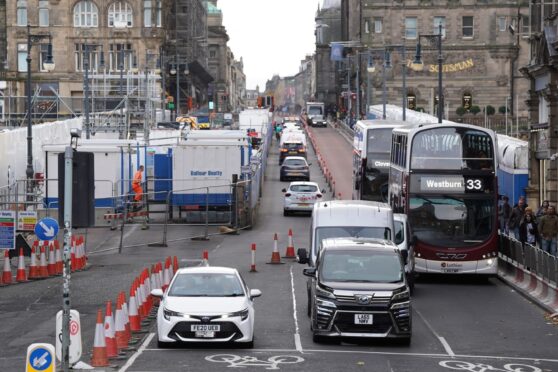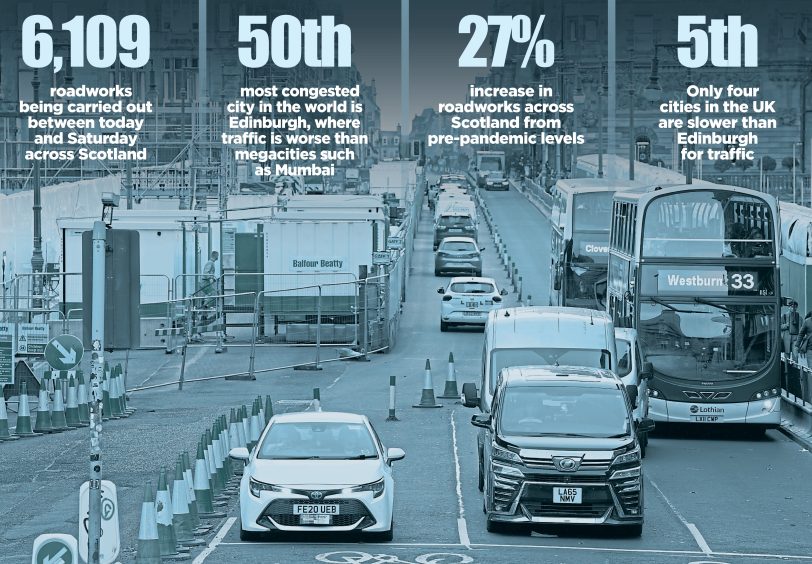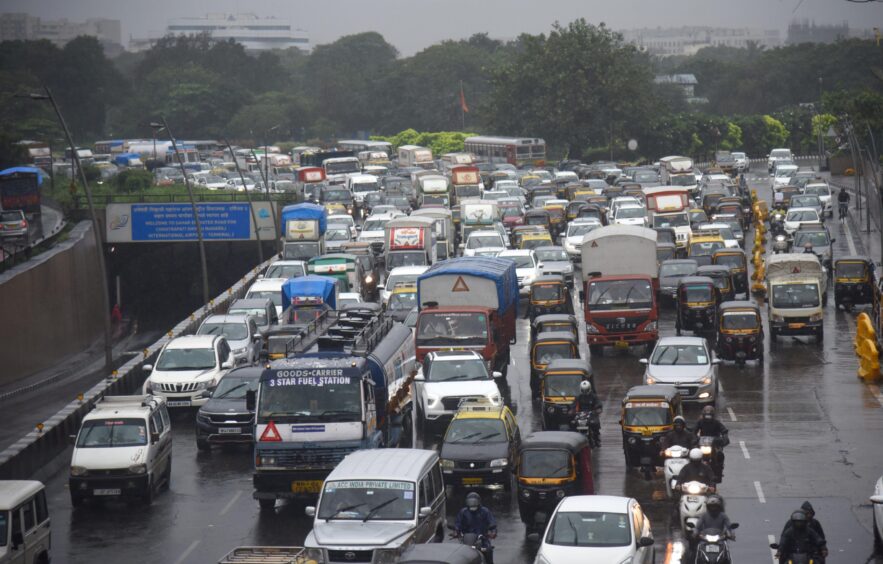
More than 6,000 roadworks will be ongoing across Scotland this week, prompting business leaders and drivers to express frustration at the delays caused by the deteriorating condition of Scotland’s roads.
According to the Scottish Road Works Commissioner, figures indicate 6,109 roadworks being carried out between today and Saturday across Scotland, a total which doesn’t include any emergency and urgent works that might occur. This represents a significant leap on the same week five years ago, when 4,686 roadworks took place, though is down on last year.
The figures highlight the pressures Scottish roadways are facing as concerns about congestion in the nation’s cities grow. According to TomTom’s Traffic Index, Edinburgh was last year the fifth slowest city for traffic in the UK, and 50th most congested in the world. The figures for average travel speed and congestion showed traffic in the capital was worse than in megacities such as Mumbai and Cairo.
The coming week’s predicted total shows a drop from the same week last year, when there were 6,722 roadworks taking place, but the figure is expected to be higher when emergency and urgent works are taken into account.

In March, the Scottish Road Works Commissioner’s annual figures showed that 163,147 roadworks took place, an 8% jump from the previous year, and 27% climb from pre-pandemic levels.
The delays have prompted anger from motorists.
Alan, 60, a taxi driver working in Glasgow, said: “The roads are a disgrace. The whole of Glasgow city is a disgrace. In the past couple of years, you can add another 10 to 15 minutes onto any journey through the city. It makes your job a lot more difficult driving, and more expensive for customers. I took a woman home yesterday, a journey she said usually cost £15, and the fare was £20.50. It’s not fair on customers, and it’s not fair on us.”
High congestion levels risk having a significant impact on economies all over Scotland. The Scottish Chambers of Commerce said it has consistently highlighted the importance of maintaining the local road network and investing in new large-scale road infrastructure projects.
Chief executive Liz Cameron said: “At a time when many of our 12,000 member organisations are already struggling with increased costs and reduced footfall, the last thing they need is protracted and poorly managed roadworks further adding to their challenges. Local government and other organisations involved in road maintenance bear a responsibility to ensure communications are timely and effective, and delays and disruption to businesses and customers are minimised.”
Andrew McRae, Scotland Policy Chair for the Federation of Small Businesses, said three-quarters of small business rely on vehicles and a well-maintained network of roads for the everyday running of their businesses:
“The poor state of repair of the nation’s potholed roads is a drain on our small businesses. Not only is getting stuck in traffic at yet another set of roadworks lost time, but potholes lead to damaged vehicles. There needs to be better co-ordination between council and utility companies when roads need to be dug up. We would also like to see local authorities making more use of technology to identify when work needs to be carried out before the roads start to crumble.”
In August, a Freedom of Information request by the Labour Party revealed an enormous road repair backlog hanging over local authorities. 28 out of 32 councils in Scotland provided figures for the request, and the total bill amounted to £2,562,057,538. This shows a considerable leap from two years ago, when Labour obtained figures that showed the bill for repairs across Scotland was roughly £1.7 billion.
Council umbrella group COSLA said: “Councils are committed to keeping roads safe and they carry out critical maintenance where necessary. However, council finances are under intense pressure, and a £54 million cut to councils’ capital budget in 2024/25 has had an impact on local authorities’ capital programmes.
“To meet the high standards and efficiency for essential services, including road maintenance, councils will need to see adequate capital funding in the next budget.”
Transport Scotland, which oversees the management and repairs on all trunk roads and motorways across Scotland, said it is providing more than £1bn for critical safety, adaptation, maintenance and improvement priorities on these roadways.
Transport Scotland added: “We understand the frustration of drivers and the concerns of stakeholders over major roadworks, which unfortunately are a necessary and essential part of looking after the trunk road network and preventing accidents, as well as looking after our assets.
“This often critical work is regularly scheduled at quieter times or overnight to help avoid major delays, however this isn’t always possible, for safety purposes. Roads authorities and utility firms have a duty to co-ordinate all roadworks on any road for which they are responsible, and are ultimately responsible for any decisions related to the repair and maintenance of their roads.”
Heading for a breakdown: Car garage waiting times soar

By Russell Blackstock
The soaring price of new vehicles, a growing shortage of mechanics and the ongoing impact of Brexit has created a perfect storm for Scots drivers, with many now facing long waits to get their cars repaired, motoring experts warn.
The average lead time for booking a garage slot has risen by almost 60% since before the Covid-19 pandemic, figures show.
It means many drivers are now waiting an average of 13 working days for repairs – often much longer – leading to inconvenience and extra expense. Motoring experts say people are hanging on to their old cars for longer because of the rising cost of buying new vehicles, meaning more repairs are needed. This, combined with a shortage of replacement parts since the UK left the European Union, and a shrinking pool of young mechanics entering the trade, has left many garages overwhelmed.
The RAC said some garages are also still contending with a backlog caused by cars that had MOTs delayed during Covid and that main dealers are charging more for servicing, causing customers to shop around.
“However, it is local garages with smaller teams that are hit hardest by the lack of qualified technicians as they struggle to hire more staff to meet demand,” RAC head of policy Simon Williams said. “There is also an industry shortage on parts supply which we see as the main factor, as some of these can be on back order for months. We also know from research that motorists are delaying repairs, reducing or even stopping servicing their vehicles altogether to save money which is very concerning, as this could lead to an increase in the number of unroadworthy vehicles.”
The AA said that when drivers face an extended wait for their vehicles to be repaired, the social and economic effects of being without a car, especially for those in rural areas, can be far-reaching.
“This can mean finding alternative ways of getting their children to school, visiting, or caring for dependents and getting to work on time, particularly in areas with weak public transport links,” the AA said. “In many cases, modern life is tailored to depend on a car for mobility and when that car is removed, weaknesses in the public transport infrastructure are highlighted.” The organisation has called for more investment in skills and training within the motor industry to clear the backlogs.
“More skilled technicians would drastically reduce waiting times for customers,” it said. “Linked to this, particularly in Scotland, is the migration of skilled workers from garages to other areas where their skills can be transferred, areas such as wind farms and the oil industry.”
The situation has also led to a growing number of complaints from drivers about long waiting times being lodged with the Motoring Ombudsman. And insurers are also writing off vehicles because of indefinite repair delays, according to the National Body Repair Association, which estimates that drivers in some regions are having to wait five weeks longer than the pre-pandemic average. The Association of British Insurers said: “We and our members appreciate that waiting long periods to get a vehicle repaired can be frustrating for drivers. The industry is committed to supporting the vehicle repair sector as it faces labour shortages and part supply issues.”
Independent road safety charity IAM RoadSmart advised drivers not to wait until the last minute.
“Don’t expect to walk into a garage and get an MoT while you wait,” policy advisor Neil Greig said. “Check the local garages and book well in advance.”
Transport Scotland said it is aware of the backlogs and is working with Skills Development Scotland to maximise high-quality apprenticeships for young people, including within the motor trade.
It said: “Skills Development Scotland has commenced contracting for new apprenticeship opportunities and our investment will support up to 25,500 new Modern Apprenticeship starts. This will also continue to provide support for around 38,000 apprentices already in training.”
Murray Wilson, from Edinburgh Specialist Cars said the shortage of apprentice mechanics is largely due to the rapid rise of electronic technology in vehicles.
“Traditional mechanical skills alone aren’t enough. Mechanics now need expertise in both electronics and diagnostics,” he said. “Yet many training courses haven’t kept pace.”
Wilson also highlighted that despite advertising for new hires, his garage and others have seen few applicants as many mechanics have switched to other jobs.

Enjoy the convenience of having The Sunday Post delivered as a digital ePaper straight to your smartphone, tablet or computer.
Subscribe for only £5.49 a month and enjoy all the benefits of the printed paper as a digital replica.
Subscribe © Mhairi Edwards
© Mhairi Edwards © Vijay Bate/Hindustan Times/Shutterstock
© Vijay Bate/Hindustan Times/Shutterstock